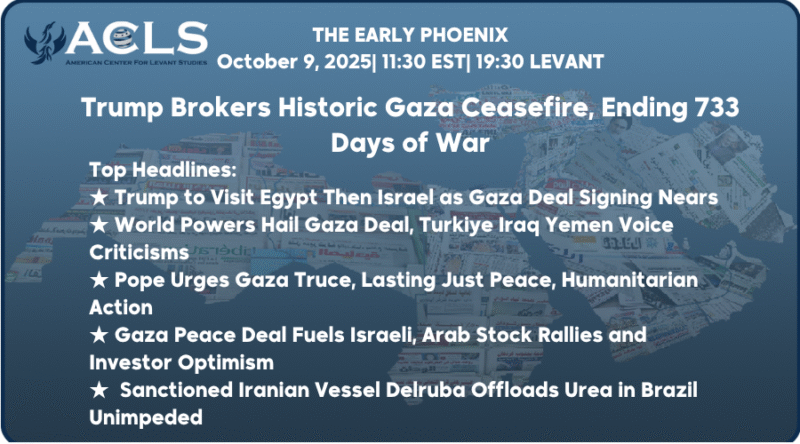
★ U.S.A
-
Trump Ends Israel-Hamas 733 Days of War
President Trump announced the end of the 733-day war as Israel and Hamas approved his 20-point peace plan, signing a landmark agreement for an immediate ceasefire. The deal mandates the release of all Israeli hostages and about 2,000 Palestinian prisoners excluding key Hamas leaders from release, a phased Israeli military withdrawal, and a surge in humanitarian aid, with postwar Gaza governance and disarmament benchmarks still under review. The Israeli cabinet ratified the accord following intense debate, ensuring rapid implementation and robust monitoring by U.S., Egyptian, Qatari, and Turkish mediators. Celebrations spread across Israel and Gaza, though future security, political authority, and reconstruction remain open for negotiation and international oversight.
-
Trump to Visit Egypt Then Israel as Gaza Deal Signing Nears
President Trump will travel to Egypt first this weekend to witness the formal signing of the Gaza peace agreement alongside President Sisi in Sharm el-Sheikh, then proceed to Israel to meet Prime Minister Netanyahu and address the Knesset. Multiple American and international sources confirm Trump’s itinerary, timed to coincide with finalizing the hostages-for-ceasefire accord. The White House and State Department cited his personal presence as essential to securing and endorsing the deal, underscoring direct U.S. involvement in implementation and regional diplomacy.
-
World Powers Hail Gaza Deal, Demand Justice, Warn on Fragility
Major powers welcomed the Israel-Hamas peace deal as a breakthrough but issued caveats emphasizing enforcement, humanitarian access, and next steps. The U.S. and mediators Egypt, Qatar, and Turkiye praised compromise and urged rapid implementation. The EU, Germany, France, and UK called it fragile and insisted on a clear path to a two-state solution, protection of civilians, and full Israeli and Hamas compliance. Russia and China cautioned that U.S. dominance may sideline multilateralism and statehood talks, pressing for lasting, UN-backed solutions. Arab states stressed the deal must only be the first step toward comprehensive, just peace rooted in established Palestinian rights.
-
Regional Critics Warn Gaza Deal Risks Oversight, Loss of Sovereignty
Turkiye praises the ceasefire and pledges strict oversight, but labels prior Israeli actions “genocide” and insists on a two-state solution. Iraq’s media denounces the agreement as U.S.-imposed trusteeship, arguing Gaza is left under international control at the cost of local sovereignty. Yemeni analysts frame the accord as exposing the Houthis’ marginalization, with Hamas praised for realism but Houthis mocked for empty resistance rhetoric.
-
Pope Urges Gaza Truce, Lasting Just Peace, Humanitarian Action
Pope Leo XIV called for honest reporting on Gaza, urged global leaders to secure a lasting and just peace, and emphasized immediate humanitarian relief, implying the need for moral accountability and urgent action to end civilian suffering.
-
Gaza Peace Deal Fuels Israeli, Arab Stock Rallies and Investor Optimism
The signing of Trump’s Gaza peace plan drove the Tel Aviv Stock Exchange to record highs, with the TA-35 up 1.9% and sector indices in construction, real estate, insurance, and banking posting 2.4%–10.6% gains, while the shekel appreciated to a three-year peak—reflecting strong investor hopes for economic revival and renewed foreign demand. Across the Arab region, major Gulf markets surged in tandem: Dubai jumped over 3%, Saudi Arabia’s Tadawul rallied, as did indices in Abu Dhabi, Qatar, and Egypt, where the EGX30 rose 1.7%. Market sentiment pointed to cautious optimism and broader anticipation for economic normalization, directly linked to the ceasefire’s potential for regional stability and long-term investment.
===========
★ IRAN
-
Sanctioned Iranian Vessel Delruba Offloads Urea in Brazil Unimpeded
A U.S.-sanctioned Iranian cargo ship discharged 60,000 tons of urea in Brazil valued at $24.4 million this week. Port and customs data show the IRISL vessel Delruba offloaded fertilizer tied to Iran’s Pardis Petrochemical Company, accused by U.S. officials of funding the IRGC.
-
Tehran Times Claims German Troops Aided Israel Against Iran
The Iranian state-linked Tehran Times claims Germany secretly deployed troops to support Israel’s 12-day war on Iran, citing unnamed Israeli military and Iranian intelligence sources. The outlet alleges Chancellor Friedrich Merz knew of the strikes in advance, defended Israel’s actions as “dirty work,” and provided both financial and operational aid. It reports German soldiers joined Israeli operations under a confidential pact and later withdrew when Iran retaliated. No independent verification supports these claims.
===========
★ LEBANON
-
Israeli Citizen Secretly Tours Hezbollah Districts in Lebanon Undetected
Ultra-Orthodox Israeli Benny Wexler, using a foreign passport, secretly entered Beirut, toured Hezbollah-controlled districts, and visited Jewish sites—including the Magen Avraham Synagogue—without his Israeli identity being discovered. Wexler evaded detection with disguised documentation, concealed Hebrew items, and relied on local intermediaries; he reported tense airport questioning but completed his visit and exit without incident. His covert tour during heightened regional tensions drew widespread coverage in Israeli and Arab media, highlighting persistent security vulnerabilities and potential diplomatic sensitivities.
=========
★ IRAQ
-
Sixty Percent of Iraqi Election Candidates Use Drugs, Al-Hais Claims
Anbar Salvation Council head Hamid Al-Hais claimed on national TV that as many as 60% of male and female candidates in Iraq’s upcoming elections are drug users. Al-Hais called for comprehensive drug testing by electoral and judicial authorities to safeguard electoral integrity and restore public trust. He alleged drug abuse spans new contenders and senior politicians, citing it as a serious threat to the future of Iraq’s political process.
===========
★ Disclaimer: The Early Phoenix is a digest of various news sources compiled by the Early Phoenix team and edited by Rania Kisar. The items are curated, concise summaries of news items hyperlinked within each story. The items and summaries presented do not necessarily represent the views of the American Center for Levant Studies.



